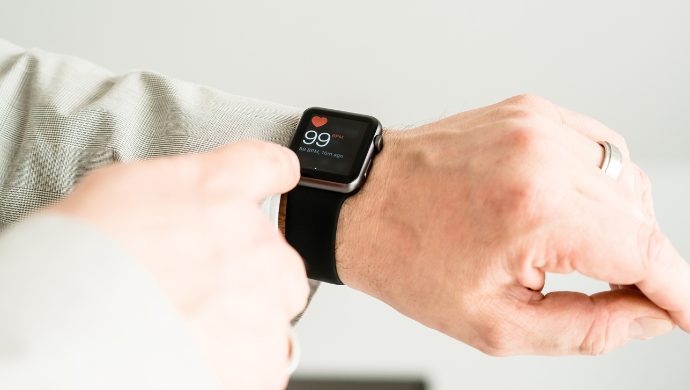Apple’s Apple Watch is currently facing a possible ban on two accounts of patent infringement cases.
On January 20th, Apple was found infringing on two of AliveCor’s patents covering portable electrocardiogram (ECG) technology by the U.S. International Trade Commission (ITC). AliveCor is a medical device and AI company that provides ECG hardware and software.
In the meantime, on January 10, 2023, Masimo Corp., a medical device company based in California, won an initial ruling against Apple, in which an administrative judge of the Commission also found that the Apple Watch Series 6 infringed on one of Masimo’s pulse oximeter patents.
In this article, we will examine the AliveCor case and the patents-in-suit.
*You can read our analysis of the Masimo dispute with Apple in our accompanying article.
Table of contents
- Background of the AliveCor vs. Apple Dispute
- The Patents-in-suit
- The Quality of the Patents
- Examining the Portfolio of the Patents-in-Suit
- Our Findings
Background of the AliveCor vs. Apple Dispute
Back in 2016, AliveCor launched a watchband and an app that allowed Apple Watch wearers to track their ECG readings — the KardiaBand. The product was marketed at the time as “the world’s smallest single lead medical grade ECG” and received FDA approval a year later (November 2017). However, one year later, in 2018, Apple also received FDA approval for the ECG function built directly into the Apple Watch, eliminating the need for AliveCor’s product.
AliveCor fired the first shot by filing a complaint on December 7, 2020, at the Texas Western District Court (AliveCor, Inc. v. Apple Inc. WDTX-6-20-cv-01112), accusing Apple of infringing on three of its arrhythmia tracking and scoring patents. This case is currently stayed, awaiting the ITC investigation.
On April 19, 2021, AliveCor brought the dispute to the Commission, seeking to ban imports of the Apple Watches that it claims to be infringing. The three patents in this ITC case are the same as those asserted in the district court case.
This was quickly followed by 11 PTAB cases Apple filed against AliveCor between June 2021 and September 2022. These cases include those that challenge the patents-in-suit for the district court and ITC cases (IPR2021-00971, IPR2021-00972, and IPR2021-00970).
Apple countersued AliveCor on December 2, 2023, by filing a patent infringement complaint at the California Northern District Court (NDCA-4-22-cv-07608) over three of its heart rate monitoring patents.
The interesting part about this dispute is…
- On December 6, 2022, the three patents-in-suit were all found completely unpatentable by the PTAB.
- On January 20, 2023, the ITC found Apple infringing on the three patents-in-suit.
- In early March, AliveCor appealed the PTAB decisions to the U.S. Court of Appeals for the Federal Circuit.
To summarize, the ITC found Apple infringing on the three patents, but the PTAB invalidated all claims of the three patents. Therefore, a ban cannot be enforced until the patentability of the three patents has been determined, which may take several months to resolve.
We will examine the three patents-in-suit in this article to see if we can find any insights that hint at the possible outcome of the dispute.
The Patents-in-suit
The three patents involved in the dispute covers AliveCor’s method for tracking arrhythmia or atrial fibrillation based on user data, which can be accessed through a smartphone or tablet app.
The patents-in-suit are:
- US 10,595,731 “Methods and systems for arrhythmia tracking and scoring”
- US 10,638,941 “Discordance monitoring”
- US 9,572,499 “Methods and systems for arrhythmia tracking and scoring”
All three patents were developed by AliveCor and correspond to two patent families. The patents that the Administrative judge found infringed by Apple are the ‘731 and ‘941 patents, which were granted more recently in 2020 (the ‘499 patent was granted in 2017).
The Quality of the Patents
In this section, we look at the quality issues of the three patents-in-suit. Table 1 shows the challenges the patents encountered during prosecution and the number of novelty prior art provided by Quality Insights.
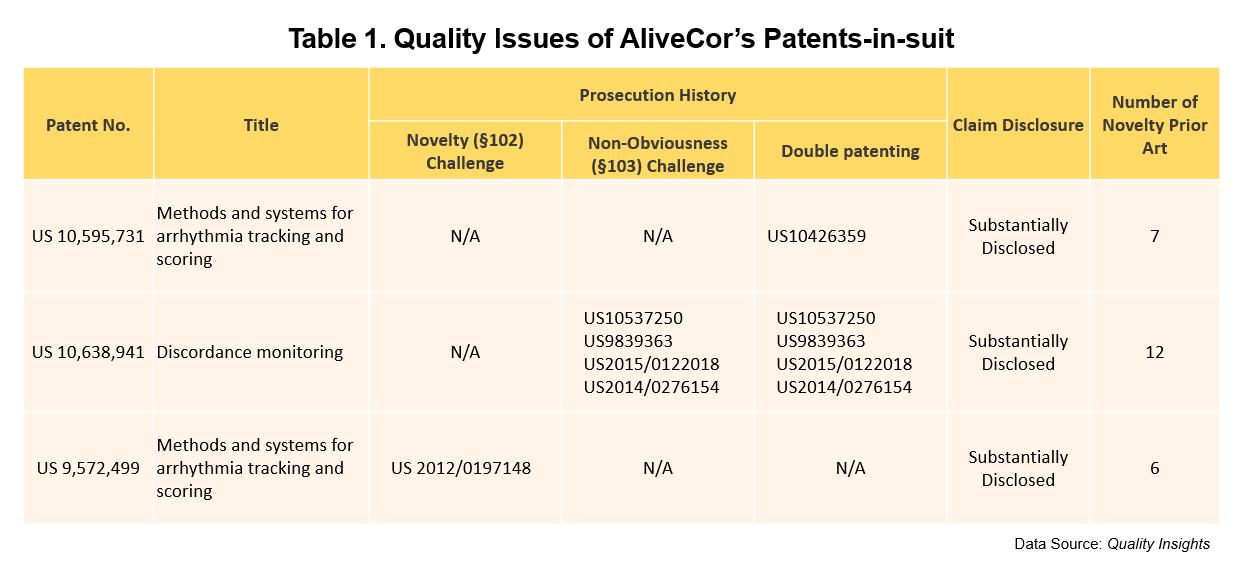
All of the patents have encountered challenges during prosecution. However, as all three patents were found to be completely unpatentable, we have consolidated the reasons for invalidation in the table below.
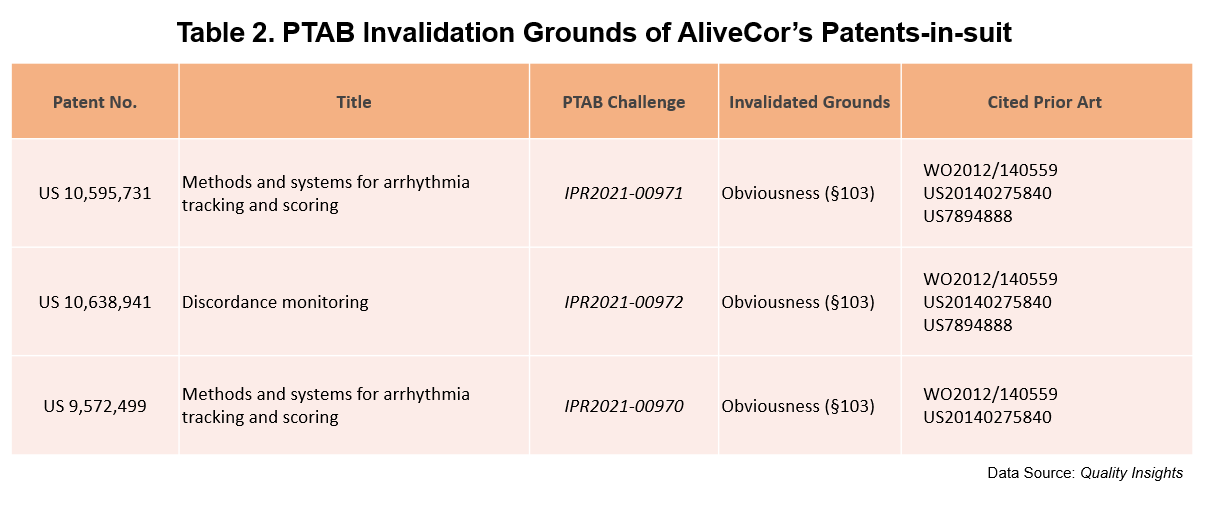
All claims of all three patents were challenged and invalidated by the PTAB on the grounds of obviousness (35 u.s.c. §103), citing the same patent prior art, namely, WO2012/140559 (Shmueli) and US20140275840 (Osorio).
Examining the Portfolio of the Patents-in-Suit
The portfolio of AliveCor’s patents-in-suit, including family members, consists of 18 patent applications corresponding to two families and covering five jurisdictions. Among the 18 patents, 14 are active patents deployed in all (except for WO) regions.
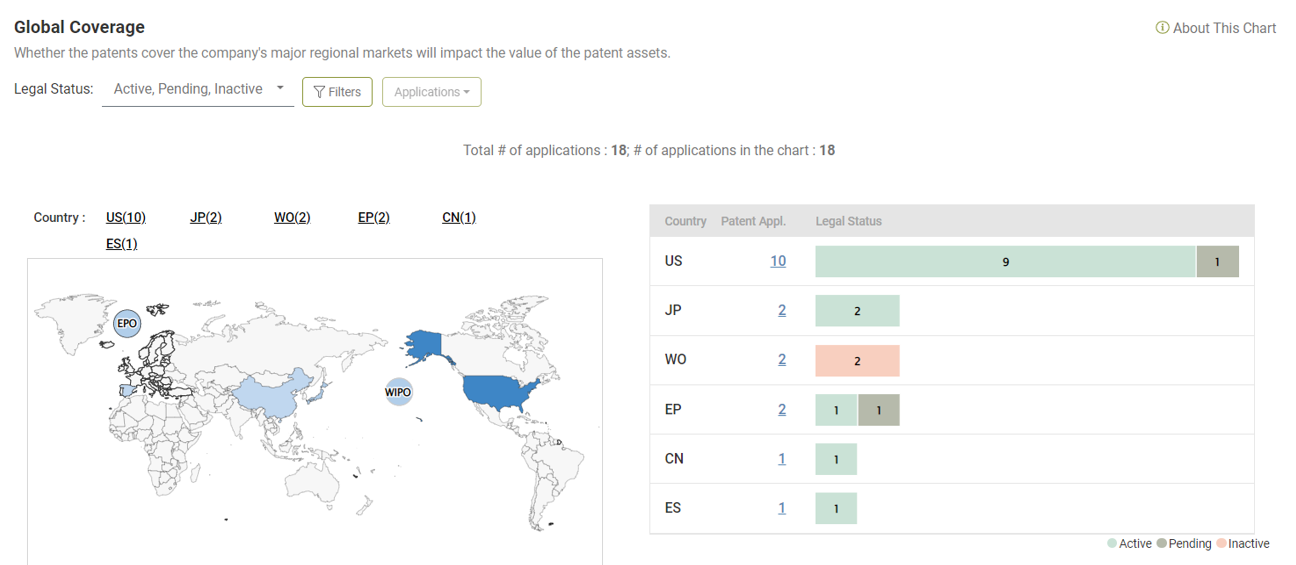
Most of the active patents can continue to be enforced in the next decade or so, with patents expiring the earliest in 2034.
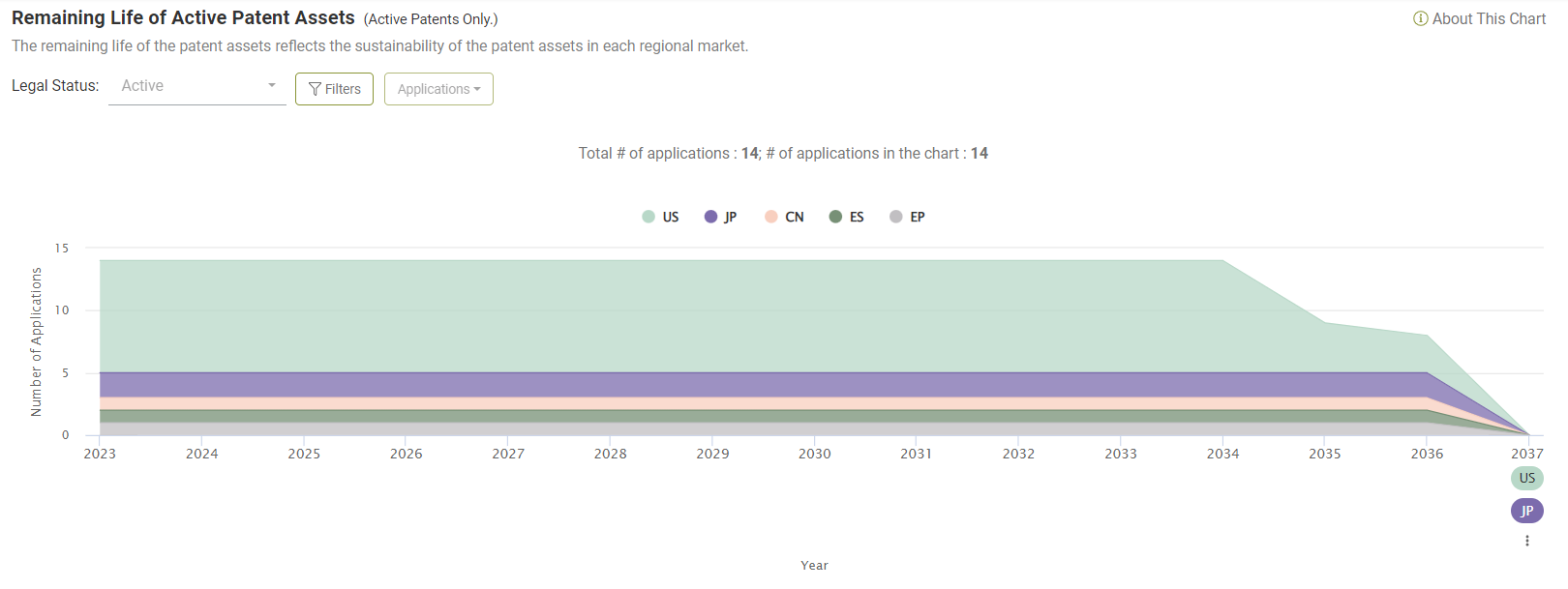
As for the quality issues in the portfolio, the Due Diligence report shows that 90% of the U.S. patents in the portfolio have encountered eligibility and novelty challenges in their prosecution history and PTAB history, indicating potential patent quality concerns.
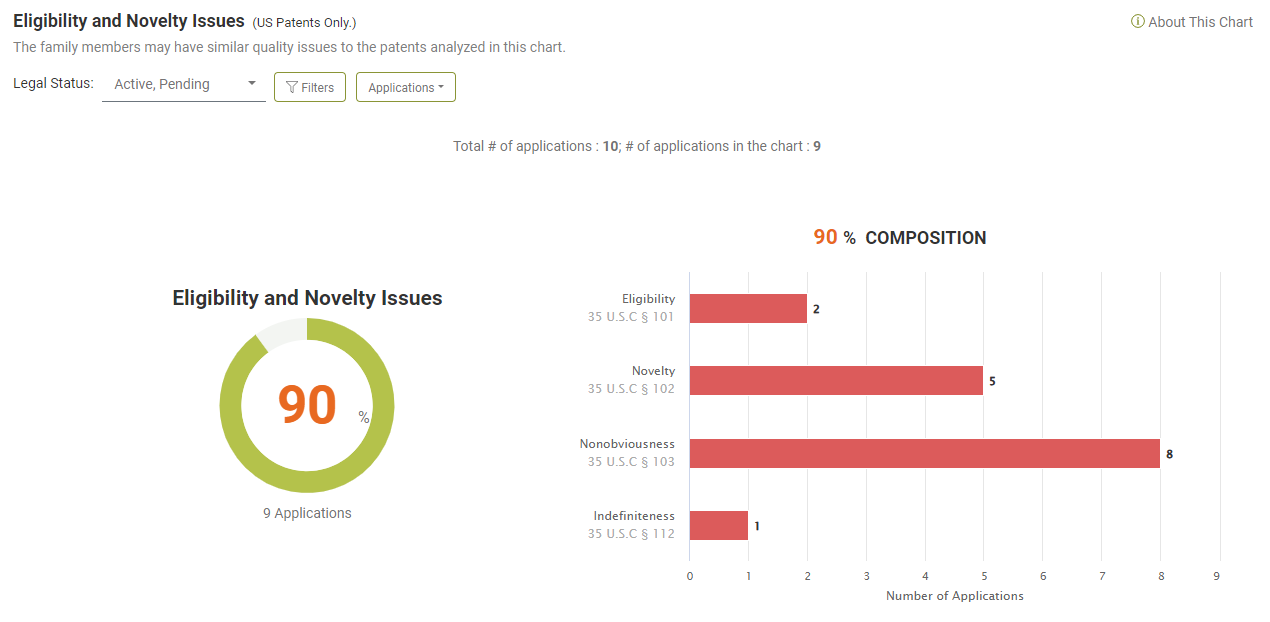
Our Findings
Our inspection analysis shows that AliveCor’s patents-in-suit have quality issues apart from those indicated in the invalidation decisions made by the PTAB based on the grounds of obviousness (§103). We also found a number of novelty (§102) prior art for each of the patents.
In addition to the quality issues of the patents-in-suit, a high (90%) percentage of the patents and their U.S. family members have also encountered eligibility and novelty issues, indicating quality concerns of the entire portfolio.
Interestingly, the Commission raised the issue of whether the patents should be invalidated, as Apple only challenged the patents on the grounds of obviousness, and neither party addressed the issues of anticipation. The ITC stated in its Review of the Final Determination:
“We therefore agree with AliveCor that the [Initial Determination] erred in failing to consider the evidence of secondary considerations before concluding the relevant claims of the ’731 patent are invalid as obvious. The Commission finds that the ID’s secondary consideration findings as to the ’941 patent applies to claims 1, 12, and 16 of the ’731 patent as well.”
The ITC case was appealed on March 07, 2023, and the PTAB cases were also appealed. The Biden administration has also stood by the ITC’s decision to ban the import of Apple’s infringing products.
We will need to wait some time before we can see if the import ban will be enforced, as the Commission plans to wait until all related appeals have finished.
Read more about Apple’s other Apple Watch dispute with Masimo here!
If you want to run a quality report of your own, try out Quality Insights by clicking the button below!
OR
Contact Us for more information on analyzing patent data!
